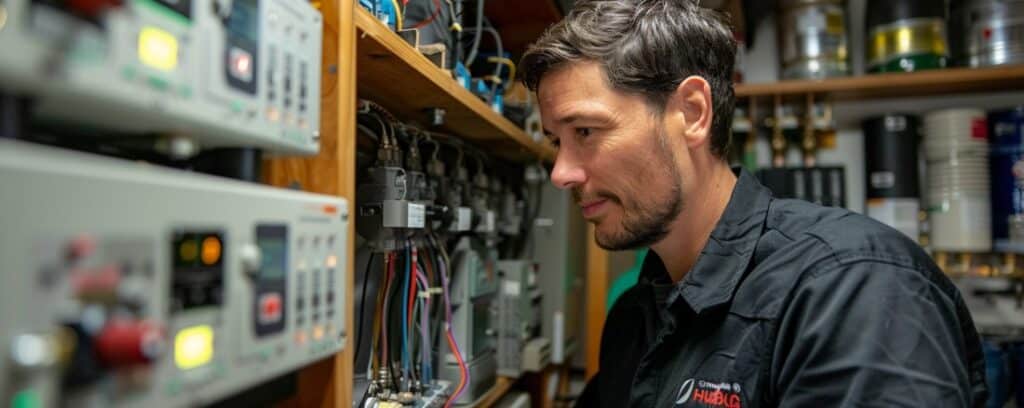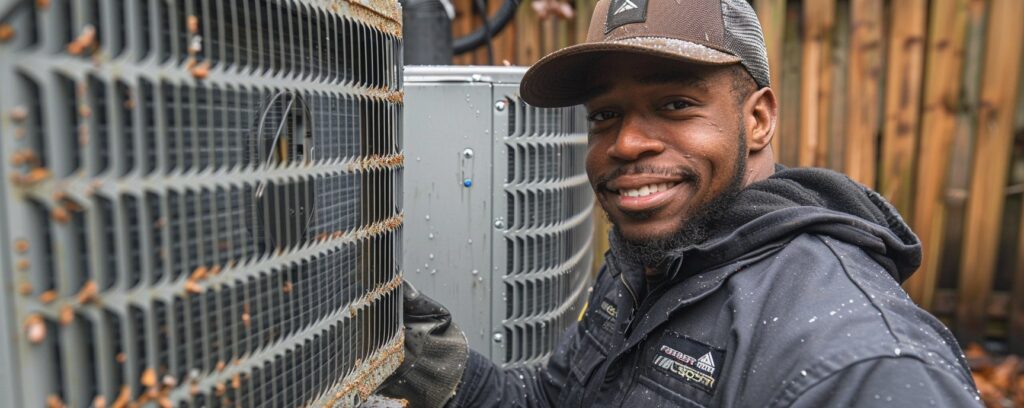Heating, Ventilation, and Air Conditioning (HVAC) systems are an integral part of modern infrastructure, ensuring comfortable indoor environments in homes, offices, and other buildings. With the increasing emphasis on energy efficiency and sustainable living, HVAC engineers have become pivotal in the design and management of these systems. As buildings become more complex, the role of an HVAC engineer has grown in both importance and demand. They ensure that the environmental conditions within a building are optimized for comfort and efficiency, making their expertise highly valued in today’s construction and design industry.
Steps to Become A HVAC Engineer
1. Education
Before diving into the world of HVAC engineering, it’s crucial to establish a strong educational foundation. Most HVAC engineers begin with a bachelor’s degree in Mechanical Engineering or a related field. This degree provides an in-depth understanding of the principles underlying HVAC systems, including thermodynamics, fluid mechanics, and system design. Some colleges also offer specialized HVAC engineering programs, which are tailored to provide students with the specific knowledge and skills needed in this industry.
While formal education is an essential step, it is the practical application of this knowledge during the coursework—like labs, projects, and hands-on activities—that truly prepares students for real-world challenges.
2. Licensure and Certification
Once you’ve completed your education, obtaining a professional license is the next pivotal step. In many regions, working as an HVAC engineer requires a Professional Engineer (PE) license. This typically involves passing a series of exams and accumulating a certain number of supervised working hours in the field.
Beyond mandatory licensure, there are several certifications that HVAC engineers can pursue. Organizations like the American Society of Heating, Refrigerating, and Air Conditioning Engineers (ASHRAE) offer certifications that can make you stand out in the job market. Certifications not only validate your expertise but also demonstrate your commitment to maintaining the highest standards in your work.
3. Hands-On Experience
Real-world experience is invaluable in the HVAC engineering field. Most aspiring HVAC engineers start by securing internships or entry-level positions that allow them to gain practical exposure to various HVAC systems. This experience is vital for understanding the complexities and nuances of different systems, from design and installation to maintenance and troubleshooting.
Over time, as you garner experience, you’ll have opportunities to work on more complex projects, perhaps even leading teams and handling client consultations. This hands-on experience not only solidifies your technical knowledge but also develops soft skills like project management, communication, and problem-solving, all of which are essential for a successful career in HVAC engineering.
Why Become an HVAC Engineer?
In an era where sustainable living and energy efficiency are at the forefront of construction and design, the role of an HVAC engineer has never been more crucial. But why should one consider this career path?
For starters, HVAC engineers play a pivotal role in creating comfortable and safe indoor environments. Whether it’s a sweltering summer day or a chilly winter night, these professionals ensure that people can go about their daily lives in comfort, without giving a second thought to the ambient temperature.
Moreover, with the increasing awareness of global warming and its consequences, there is a growing demand for HVAC systems that are not only efficient but also environmentally friendly. This offers a rewarding challenge for HVAC engineers who are at the intersection of technology, sustainability, and innovation. They have the unique opportunity to directly impact energy conservation efforts, reduce carbon footprints, and contribute to a greener future.
Lastly, the field of HVAC engineering offers diversity. From designing systems for skyscrapers to troubleshooting problems in residential apartments, every day is different, making it a dynamic and ever-evolving profession.
Where do HVAC Engineers Work?
HVAC engineers have multiple avenues for employment:
Construction Companies: Integration of HVAC systems into new infrastructural projects.
Design and Architectural Firms: Harmonizing aesthetic and functional elements of a building through efficient HVAC designs.
Manufacturing Sector: Involved in R&D for HVAC equipment. Ensuring products meet industry standards and are innovative.
Public Sector: Government agencies and utilities hire HVAC engineers for tasks related to infrastructure, energy conservation, and regulatory tasks.
Self-Employment: Those with an entrepreneurial mindset can consult for various clients, from homeowners to corporations, providing specialized HVAC solutions.
HVAC Engineer Salary
According to the U.S. Bureau of Labor Statistics, the average annual salary for HVAC engineers is $51,390.
The earning potential for HVAC engineers varies based on multiple factors:
Geographical location: Some states or regions might offer higher salaries due to climate or construction trends.
Experience: Years in the field and depth of knowledge can significantly impact earnings.
Specialization: Niche specializations can command higher salaries due to unique expertise.
The highest salaries in the HVAC engineering domain often go to those with a blend of advanced education, vast experience, and niche expertise.
HVAC Engineer Career and Job Growth
According to the Bureau of Labor Statistics, demand for HVAC engineers is expected to grow by 6% by 2032, faster than average for all occupations.
The future is promising for HVAC engineers. With the global emphasis on sustainable practices and energy conservation, the expertise of HVAC engineers is continually sought after. As structures, whether residential or commercial, are becoming more sophisticated, the integration of advanced HVAC systems plays a pivotal role in their design and functionality.
Moreover, as older infrastructures undergo renovations, updating and retrofitting HVAC systems to modern standards becomes imperative. This not only ensures the systems’ efficiency but also prolongs their lifespan, creating numerous job opportunities in the field.
Another driving factor is the increasing awareness of indoor air quality and its significance for overall well-being. As research continually underscores the importance of a healthy indoor environment, HVAC engineers are called upon to design and manage systems that prioritize air quality while maintaining energy efficiency.
In comparison with other engineering domains, HVAC engineering boasts a robust job growth rate. This can be attributed to its interdisciplinary nature, intertwining mechanical design with environmental sustainability, thereby making HVAC engineers indispensable in today’s market.
HVAC Engineer Training Programs
Associate’s Degree
The foundation of any successful HVAC engineer is a solid educational background. Most aspiring engineers start with an Associate’s Degree in HVAC Engineering. This degree offers a basic understanding of HVAC systems, their design, and functioning. Though it can lead to entry-level positions, many professionals often see it as a stepping stone to more advanced studies.
Bachelor’s Degree
A Bachelor’s Degree in HVAC Engineering or Mechanical Engineering offers a more in-depth insight into the intricacies of HVAC systems. Apart from theoretical knowledge, students get substantial hands-on experience, allowing them to handle more complex challenges in the real world. With this degree, one can expect to assume roles that involve not only system design and maintenance but also project management and team leadership.
Master’s Degree
For those wanting to delve deeper or specialize, pursuing a Master’s Degree is the path forward. Specializations might include areas like energy management, system optimization, or sustainable design. Advanced degrees open doors to research roles, consultancy, and top-tier managerial positions in large firms.
Challenges Faced by HVAC Engineers
The dynamic realm of HVAC engineering, while filled with innovations and advancements, also presents its unique set of hurdles. One of the most pronounced challenges is adapting to new technologies. The technological landscape is continually evolving, and with it, HVAC systems are growing in complexity. This constant change mandates HVAC engineers to be on their toes, familiarizing themselves with cutting-edge tools and methods. It’s a domain where continuous learning isn’t just encouraged; it’s essential.
Moreover, with the global shift towards sustainability, HVAC engineers are frequently tasked with integrating green technologies into both new and existing infrastructures. This push for eco-friendly solutions, while commendable, can sometimes clash with budget constraints or architectural limitations, requiring engineers to strike a delicate balance between sustainability and practicality.
In addition, as urban spaces become denser, the intricacies of designing HVAC systems for multi-use buildings, high-rises, or shared spaces also increase. Engineers face the daunting task of ensuring optimal comfort for inhabitants while also managing energy consumption and system efficiency.
Emerging Technologies in HVAC
The HVAC industry is at an exciting crossroads, with technological innovations promising to redefine the way we perceive indoor comfort and energy efficiency. One of the game-changers is the integration of Artificial Intelligence (AI) and the Internet of Things (IoT) into HVAC systems. These technologies, when combined, enable systems to learn from user behaviors, predict maintenance needs, and optimize energy consumption based on real-time data. Imagine an HVAC system that “understands” the habits of its users and adjusts itself for maximum comfort and minimum energy expenditure.
Another revolutionizing development is the advent of geothermal heat pumps. By harnessing the Earth’s natural heat-storing ability, these pumps offer an energy-efficient solution for both heating and cooling purposes. The brilliance of geothermal technology lies in its simplicity and its reliance on a sustainable energy source: the Earth itself.
Additionally, as the focus on air quality intensifies, we’re seeing the rise of advanced air purification technologies. With concerns about pollutants, allergens, and now pathogens, HVAC systems are no longer just about temperature control; they play a pivotal role in ensuring the air we breathe indoors is of the highest quality.
The coming years promise even more transformative technologies, ensuring that the field of HVAC engineering remains as dynamic and impactful as ever.
HVAC Engineer FAQ
As with any profession, there are common queries that budding HVAC engineers often pose. Here’s a brief rundown:
What degree do I need to become an HVAC Engineer?
A Bachelor’s degree in Mechanical or HVAC Engineering is the standard. However, depending on your career goals, you might also consider advanced degrees or certifications.
What does an HVAC Engineer do?
They design, implement, and manage HVAC systems, ensuring optimal performance, energy efficiency, and comfort. Their role can also involve troubleshooting, system upgrades, and ensuring adherence to regulatory standards.
How long does it take to become an HVAC Engineer?
Typically, a Bachelor’s degree takes about four years. However, if you add the time for licensure, internships, and possibly a Master’s degree, it can be a longer journey.
How much do HVAC Engineers make?
According to the U.S. Bureau of Labor Statistics, the average annual salary for HVAC engineers is $51,390. Salaries vary based on location, experience, and expertise. HVAC engineers can expect competitive remuneration in line with their specialized skill set.
What skills do I need to be an HVAC Engineer?
Apart from technical acumen, skills like problem-solving, effective communication, project management, and an understanding of environmental concerns are crucial.
Are there internship opportunities for HVAC Engineers?
Yes, internships are a pivotal part of the learning journey. They provide real-world experience, bridging the gap between academic learning and practical application.
Is a background in general engineering necessary to specialize in HVAC?
While a foundational understanding of general engineering principles can be beneficial, many educational programs are tailored specifically for HVAC engineering, ensuring you gain the expertise required for the field.
Are HVAC Engineers only concerned with temperature regulation?
No, while temperature is a key aspect, HVAC engineers also focus on ventilation, air quality, humidity control, and energy efficiency, ensuring a comprehensive approach to indoor environmental comfort.
How does the role of an HVAC Engineer differ from an HVAC technician?
An HVAC engineer is primarily involved in the design, planning, and optimization of HVAC systems, while a technician typically focuses on installation, maintenance, and repair of these systems.
Is the HVAC field adaptable to technological advancements like smart homes and IoT?
Absolutely! The HVAC field is continually evolving with technology. Integration with smart home systems, IoT devices, and even AI-driven predictions for optimal energy usage are some of the latest developments in HVAC engineering.
With the emphasis on green and sustainable energy, is solar an area HVAC Engineers delve into?
Yes, integrating solar energy into HVAC systems is becoming increasingly common. HVAC engineers often collaborate with solar energy experts to design systems that are both efficient and environmentally friendly.
Is continuous education important in the HVAC field?
Given the rapid advancements in technology and sustainability practices, continuous education is crucial. This ensures HVAC engineers stay abreast of the latest trends, methodologies, and tools in the industry.
Conclusion
The realm of HVAC engineering is vast, dynamic, and increasingly crucial in our modern world. As we transition towards a future that places a premium on sustainability, energy efficiency, and enhanced living standards, the role of HVAC engineers becomes ever more central. From ensuring our homes are comfortable sanctuaries to making certain that our workplaces are conducive environments for productivity, these professionals touch various facets of our daily lives.
For those considering a journey into the HVAC engineering field, the path promises rich rewards: a blend of technical challenges, societal impact, and robust career prospects. And as technology and environmental consciousness continue to shape our world, it’s clear that HVAC engineers will be at the forefront of designing a brighter, more comfortable, and sustainable future for all.
Whether you’re a student contemplating this career, an industry professional looking to pivot, or simply someone curious about the buildings you inhabit, the significance of HVAC engineering is undeniable. As we conclude this exploration, one can only appreciate the harmonious blend of science, design, and innovation that HVAC engineers bring to our built environment.




